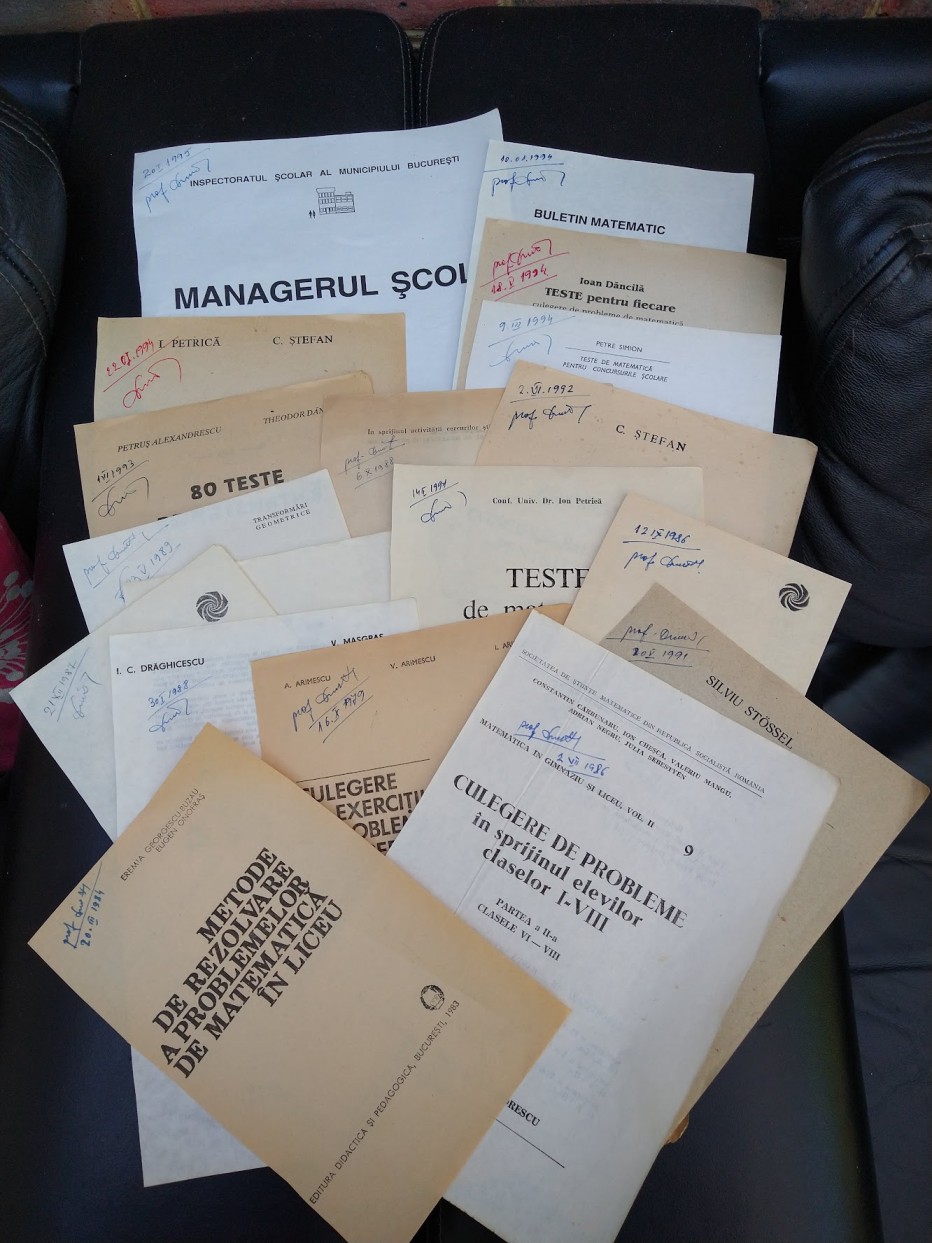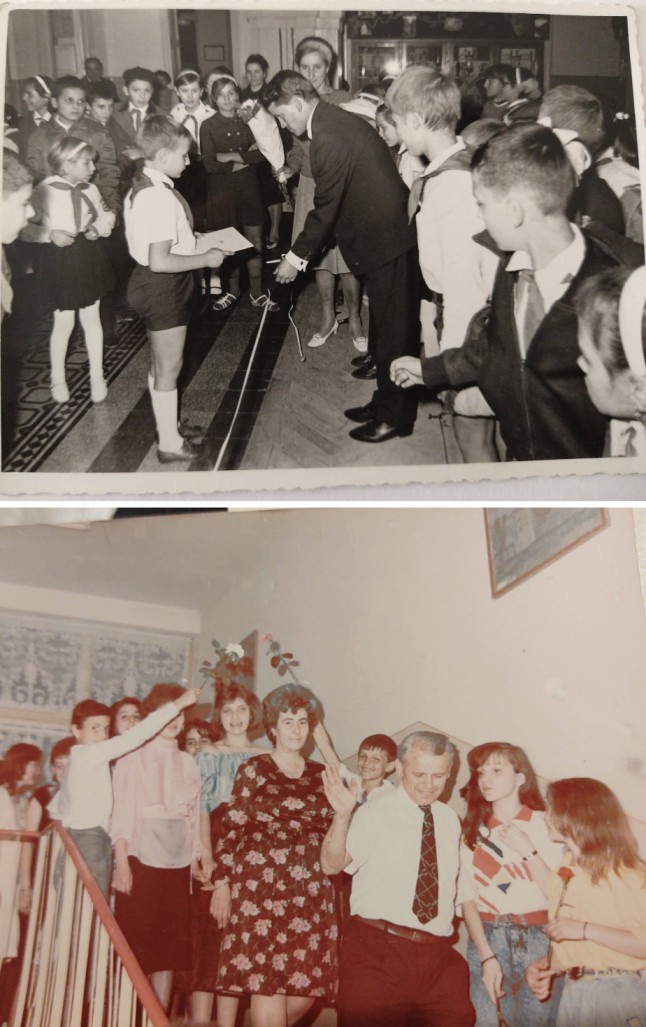Pursuit of excellence
I have lost my dad way too early, soon after he turned 56. However, what I am writing here is not from the perspective of a daddy’s girl hero-worshipping and missing her dad all those years later (though I am that too, obviously) but from the professional perspective of a senior software engineer (my job title is relevant for what follows).
My dad, Alexandru, was a dedicated math teacher. He climbed that career path, both professionally (in Romania, the teachers have professional levels and he achieved the highest) and as positions: head of math, deputy headteacher and then headteacher for the last, I think, six years of his life.
We always knew that he was an excellent and dedicated teacher with countless pupils and former pupils saying this. I could include here tons of those testimonies.
I could also mention how many of his fellow math teachers, some friends that were visiting us when I was a child, would borrow and copy many of his materials and lesson plans as they were excellent.

But there are a few more surprising things that I discovered more recently.
I mentioned previously the lovely Romanian custom of gifting books and writing messages on them as you would write on the cards, thus capturing in the book that moment in time. There was another reason to sign your books: as a sign of ownership when you lend them so to increase the chance of getting them back. Dad would sign and date his math books, mainly collections of problems. Most math teachers had one or two books of problems for their whole careers. Dad had at least two dozens, with notes and comments in the book that show how he used them.
I recently looked through those books. Way too many (I hope to find some place to gift them!) I decided, for all my unease of physically taking anything out of books, to tear these first pages with his signatures and dates, like some autographs.
With dates from 70s, 80s and 90s, these pages tell the story of his pursuit of excellence and his desire to continuously improve himself as a teacher.

To get that “grade 1” teacher qualification, among other things, the candidates had to do a piece of original research. Dad’s one has the year 1980 written on it, but most of his work was done in the middle to late 70s. I have known this work since it was written, but, and I am ashamed to say this, I didn’t look past the appearances: typed on a typewriter by a secretary he employed, math symbols added or corrected by hand, diagrams drawn with a ruler and pen. “Oh, how quaint and antiquated!” I thought, as I had wordprocessor and editors. I wasn’t much better than today’s kids saying “what, you didn’t have a tablet when you grew up? Poor you!” while they play with some app, never mind that some of us were hacking for decades and can out-program them out of the park.
When I properly looked at this work, I got goosebumps.
Though he never really used a computer, dad was a programmer and his vision was ridiculously ahead of his time,
much more that I am sure, even he realised.
The title of his work is “Algorithms and Logical Schemes. Links with computational problems from the school curriculum“.
There are 135, single sided pages. Why he would pick this topic in the 70s I don’t know.


Here is also his bibliography: familiar university courses and professors that I would later study, including the Bible of computer programming "The art of Computer Programming", by Donald Knuth from 1969.
Dad didn’t know English, I can imagine the photocopied translation he must have consulted.
I have seen such copies as a student. I am also familiar with many of these works.
They were university level courses, they would not concern themselves with middle school problems.

He says in the final section of his work (edited for brevity):
Computer science has made big advances in the last few years, both internationally and in Romania. The discipline has a strong influence on the aspirations of the younger generations. Starting the pupils on this subject from the middle school is not only possible but necessary to develop inventive and logical thinking … It is possible to start in the math club first and experiment how pupils respond to it. The speed of the algorithms achieving the desired results when compared to computing by hand gives a big satisfaction to both teachers and pupils. The universality of the algorithms, the fact that they can be applied to a class of problems is an extra argument to bravely attempt algorithmic solutions for many problems. Discussing with pupils during math classes and clubs I can see how fascinated they are for this area where their future may lay and how the school must adapt to support them. Obviously they will need to continue these studies in high school and at universities, but we can make a start in middle school. It falls on us, the education’ first line of workers to achieve the big responsibility of educating pupils for tomorrow’s world to give them the latest knowledge to seed in their consciousness the passion for work and country, to form and educate the pupils for their careers and lives.
He also recognised the importance of the computer infrastructure:
Research will have to find solutions for building a working national informatics system,
including a network of computers and data transmission systems which will have a profound
influence in economic and social development

I can put this in an international context: what was happening with computing education in middle school at the time elsewhere in the world? Here are a few facts from https://en.wikipedia.org/wiki/Computing_education :
Computer science education research emerged as a field of study in the 1970s, when researchers began to explore the effectiveness of different approaches to teaching computer programming. Computer science education has primarily only been taught at university level until recently, with some notable exceptions in Israel, Poland and the United Kingdom with the BBC Micro in the 1980s as part of Computer science education in the United Kingdom.
Looking at one of these advanced countries, UK, only in 2014 did Computing (i.e. programming as opposed to the use of computers IT, Word, Power Point etc) became a subject for 11-14 year olds though logic, hardware and binary were taught in the 1980s.
Dad was painfully modest but, surely, he must have known how great he was as a math teacher, but it pains me to think he did not realise how good and ahead of his time he was as a theoretical computer scientist. Yes, I really think he was (remember my job title that I mentioned? That’s where it comes in).
I cannot help indulging in a little what-ifs? What if dad was in charge of curriculum and, with his vision, we had programming classes from the 1980s and the specialists educated at that time. Where would Romania be now?
Sometimes, the greatest people are right next to us but it might take years, experience, reflection and perspective to understand and appreciate them.